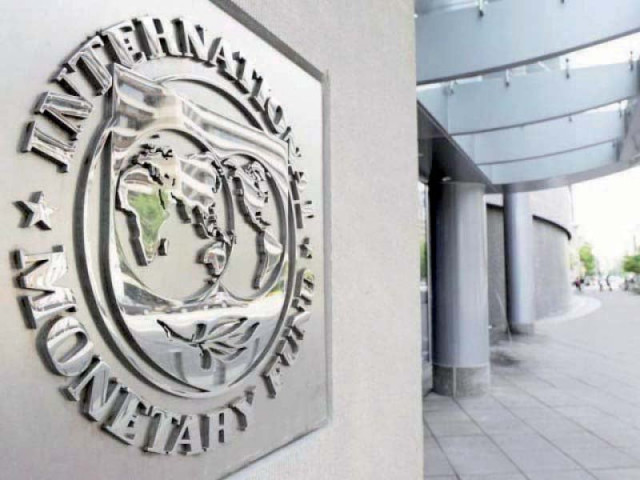IMF cuts FBR’s tax target to Rs5.23 trillion
Sees budget deficit soaring to 7.6%, introduces major changes in loan conditions

MF Mission Chief to Pakistan Ernesto Rigo had denied during a press conference in November that the FBR’s target would be reduced. PHOTO: FILE
The IMF expects Pakistan to miss the budget deficit target of Rs3.2 trillion and has projected excesses in almost all types of current expenditures including debt servicing and defence, showed a report that the global lender released on Monday.
As a result of the first review of the $6-billion loan programme implementation, the IMF has introduced some major changes in the programme conditions. It has modified nearly a dozen existing conditions, including relaxing the social sector spending conditions and introducing four more conditions.
However, the changes that the IMF has made in the fiscal framework suggest that the country is far from achieving fiscal discipline and austerity as expenditures are going to be far higher than the budget and FBR’s revenue target has been cut. These changes also deny a claim to the IMF on protecting social sector and human development spending.
Pakistan’s budget deficit will slip from the projected 7.3% of GDP or Rs3.2 trillion to Rs3.4 trillion or 7.6% of GDP, according to the IMF. But the IMF has kept the primary budget deficit, being calculated after excluding interest payments, unchanged at 0.6% of GDP or Rs257 billion.
As against the budgetary target of Rs5.503 trillion, the IMF has now cut the FBR’s tax collection target to Rs5.238 trillion - a reduction of Rs265 billion. The FBR faced Rs211-billion shortfall in first five months of the current fiscal year and even the Rs5.238-trillion target appears unrealistic.
IMF Mission Chief to Pakistan Ernesto Rigo had denied during a press conference in November that the FBR’s target would be reduced.
The fiscal year 2019-20 general government primary deficit target is achievable, but the composition of revenue has changed, said the IMF. Tax revenue is now expected to be 0.5% of GDP lower than originally expected. On the other hand, non-tax revenue is expected to be 0.8% of GDP higher than originally expected.
In order to offset the FBR target revision implications, the IMF has projected the non-tax revenue to increase from Rs710 billion to Rs1.1 trillion in the current fiscal year. Overall, the federal revenues have been shown declining from Rs5.8 trillion to Rs5.5 trillion in this fiscal year. The fiscal slippages are mainly in the federal current expenditures that have now been projected to increase from Rs6.26 trillion to Rs6.5 trillion - a rise of Rs217 billion, according to the IMF.
As against earlier estimates of Rs2.98 trillion, the IMF has now estimated interest payments at Rs3.12 trillion, an increase of Rs147 billion within a span of three months.
Defence spending has been projected at Rs1.34 trillion as against earlier estimates of Rs1.3 trillion. But the federal government has shown only Rs1.15 trillion in defence spending in the budget.
Owing to earlier underestimation of the public debt and fiscal slippages, the IMF has now projected the total public debt and liabilities will increase to Rs37.6 trillion or 84.7% of GDP by the end of this fiscal year. It has also projected that the external public and publicly guaranteed debt as a percentage of total exports will increase from the earlier projection of 234% to 246%.
Complacent IMF?
Pakistan missed the five indicative programme targets set for the first quarter (July-September), all of which were critical.
The BISP cash transfer target of Rs45 billion was missed and only Rs5 billion was given to the BISP, showed the report. The IMF said BISP spending was expected to be corrected by the end of December.
The indicative target for net accumulation of tax refund arrears of Rs75 billion was missed. The power-sector arrears target of Rs23 billion was also missed and the actual increase in the power-sector circular debt remained at Rs77 billion in the first quarter, according to the IMF.
The IMF said spending on health and education fell short of the target of Rs349 billion and remained at Rs257.2 billion - lower by Rs92 billion.
Not only that, the IMF has allowed all the governments to spend only Rs570 billion on health and education in the July-December period as against the original target of Rs698.4 billion. The IMF relaxed the health and education spending condition by Rs128.6 billion or 18.4%.
New conditions
The IMF said Pakistan was moving forward with the Public Finance Management reforms that would help achieve budgetary discipline, improve transparency and build confidence in the spending of budgetary resources.
It has introduced a condition that the finance ministry will present a mid-year budget review report by the end of February 2020 to parliament to provide budget and actual comparisons of revenue, expenditure and financing for H1FY20 as well as revised estimates for the budget year. The IMF has also imposed a continuous condition of not giving preferential tax treatment to any sector or entity aimed at stopping the government from creating more distortions.
The SBP Act amendment condition has been relaxed for December to March 2020. The IMF has modified the conditions related to government guarantees to accommodate the issuance of guarantees in the power sector, net international reserves and net domestic assets of the SBP to lock in some of the over-performance achieved by the end of September and general government primary budget deficit.
Published in The Express Tribune, December 24th, 2019.
Like Business on Facebook, follow @TribuneBiz on Twitter to stay informed and join in the conversation.



















COMMENTS
Comments are moderated and generally will be posted if they are on-topic and not abusive.
For more information, please see our Comments FAQ